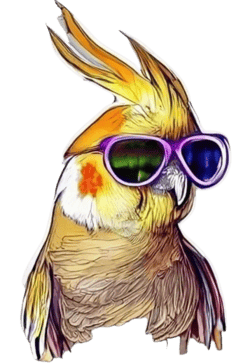Exploring the Dietary Benefits: Are Pumpkin Seeds Good For Cockatiels
Introduction
You might have heard before, birds of a feather flock together, but did you know they also eat together? That’s right! As a pet parent to a cockatiel, you’re probably aware that these feathery fellows love to chow down on a variety of foods. However, striking the balance in their diet can sometimes be as tricky as teaching them a new tune.
One such food that stirs curiosity is pumpkin seeds. Cockatiels are known for their love of seeds, but are pumpkin seeds really beneficial for them? Let’s embark on a dietary adventure together, uncovering the truths and myths about pumpkin seeds, and their place in a cockatiel’s menu.
Pumpkin Seeds: Understanding Nutritional Value
Pumpkin seeds, also known as pepitas, pack a nutritious punch. They’re a great source of vital nutrients like protein, fiber, healthy fats, magnesium, and zinc. This means that, on paper, they would seem to be a fantastic addition to your pet’s diet.
As compared to sunflower seeds or millet, pumpkin seeds are lower in calories and fats, but higher in protein and fiber. This interesting balance provides a unique dietary supplement for your avian friends, not replacing their regular meals, but acting as a healthy addition.
Health Benefits of Pumpkin Seeds for Cockatiels

Pumpkin Seeds for Healthy Plumage
In the avian world, healthy and shiny feathers are the epitome of a bird’s wellness. As it turns out, the protein and healthy fats found in pumpkin seeds can contribute positively to your cockatiel’s shiny and vibrant plumage.
Pumpkin Seeds and Digestion
The healthy fiber present in these seeds aids in digestion. It ensures the bird’s digestive tract runs smoothly, which is particularly important in cockatiels that are prone to gastrointestinal issues.
Pumpkin Seeds and Immune-boosting
These seeds are also rich in antioxidants, which play a pivotal role in building a strong immune system. Regular, yet moderated, feeding of pumpkin seeds can give your pet’s immunity a gentle boost.
Risks and Considerations in Feeding Pumpkin Seeds
While pumpkin seeds are brimming with nutritional goodness, remember the old saying: even too much of a good thing can be harmful. Overfeeding seeds can lead to obesity, which is a rising concern in pet birds.
Also, while pumpkin seeds are an excellent addition, they should not replace other food items in your pet’s diet. A bland, one-sided diet can lead to nutrient deficiencies.
The key is moderation and variety, which will provide your feathered friend with the diverse nutrients they need to thrive.
Practical Tips: How to Incorporate Pumpkin Seeds into Your Cockatiel’s Diet

When buying pumpkin seeds, opt for the unsalted, non-roasted variety. The salt and heat from roasting could potentially cause health issues for your birds.
In terms of serving, raw pumpkin seeds, whether whole or crushed, are accepted by most cockatiels. Remember, these seeds are meant to be treats or supplements, not a meal replacement.
Conclusion
In the big question of whether pumpkin seeds are good for cockatiels, the answer is a definite yes, but with prudence. These seeds are a great source of vitamins and other nutrients, but like all things, should be offered in moderation to prevent health issues. The next time you enjoy a pumpkin spice latte, don’t forget to set some pumpkin seeds aside for your feathery friend!
FAQs
How often should I feed pumpkin seeds to my cockatiel?
A few pumpkin seeds offered a couple of times per week should suffice. This, of course, will vary based on your bird’s size, age, and overall health.
Can cockatiels eat pumpkin seed shells?
Yes, cockatiels can safely eat the shells of pumpkin seeds. However, always monitor your bird to ensure they are not experiencing difficulty in consuming them.
What other seeds are safe and beneficial for cockatiels?
Cockatiels can also eat sunflower seeds, millet, and flax seeds, as long as they are raw and unsalted. Always remember, seeds should be a supplemental part of their diet, not the entirety of it.

About Me
I’m Kamran, a co-founder and content creator at cockatielhq.com. With 8+ years in the world of avian enthusiasts, I’ve gained extensive knowledge in caring for birds. From egg-laying and mating to cohabitation with other birds, dietary needs, nurturing, and breeding, I’m here at cockatielhq.com to share valuable insights for your avian companions.







